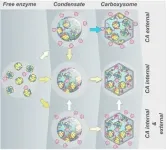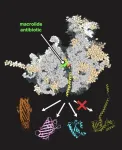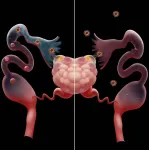Delivering "serendipity": Seemingly random product discovery, aided by technology
News from the Journal of Marketing
2021-05-25
(Press-News.org) Researchers from University of Sydney, University of Florida, and Rutgers University published a new paper in the Journal of Marketing that examines the role of serendipity in customer satisfaction and how marketers can provide it.
The study, forthcoming in the Journal of Marketing, is titled "Serendipity: Chance Encounters in the Marketplace Enhance Consumer Satisfaction" and is authored by Aekyoung Kim, Felipe Affonso, Juliano Laran, and Kristina Durante.
Netflix knows you are tired of choice. The streaming service recently introduced what might be the perfect hack: a shuffle button that eliminates choice and plays a randomly selected program for the consumer. Under COVID-19 restrictions, the newly homebound were happy to have so many programming options, but this faded over time.
Recall a time when you heard a beloved song come across the radio or stumbled upon a favorite movie while channel surfing. These accidents become "happy" because they lead to feelings of serendipity, which our new research shows heighten enjoyment. When a product, service, or experience is positive, unexpected, and involving chance, our research team reasoned that this would generate congruent feelings. Consumers would feel that the encounter was a good surprise, make attributions to chance, and feel lucky that it happened--which we collectively call "feelings of serendipity." Using a series of experiments, we set out to test our contention that marketers can create serendipity in the marketplace.
Across multiple consumer domains (online subscription services, museums, movies, food consumption, and music), creating serendipity through positive, unexpected, chance encounters increased satisfaction, enjoyment, perceptions of meaningfulness, willingness to pay, willingness to recommend a service, and interest. For example, members of subscription box services (e.g., Birchbox, Stitchfix) enjoyed their assortment more when they received a random selection of products compared to members who made selections themselves. A similar phenomenon occurred during the researchers' curated experiments. For instance, they measured consumer satisfaction using two platforms; one delivering movie recommendations and another delivering music recommendations. As Kim explains, "Compared to a condition where consumers chose for themselves, enjoyment increased when consumers received a movie or song delivered at random from a set of alternatives we had previously selected. Increased enjoyment occurred because the seemingly randomly delivered product was thought to be a good surprise, attributed to chance and luck. In other words, serendipity was born."
This good news suggests that marketers can capitalize on the power of serendipity to increase consumer satisfaction. To do this, marketers must go beyond surprising consumers, because serendipity is not just a pleasant surprise. To test the depths of serendipity, the research team carefully removed one or more of the "ingredients" to see if the serendipity effect would go away. First, they found that when an encounter was negative, consumers no longer felt increased enjoyment. In fact, there was a boomerang effect. A negative encounter that was unexpected and attributed to chance was perceived to be even more negative.
Second, when they increased and decreased the degree of randomness, it exacerbated and attenuated serendipity. Consumers who viewed a movie trailer that was described as randomly selected from 100 possible options enjoyed it more than when it came from a menu of 10 options, which made it seem less random. Moreover, making consumers aware that a marketer was selecting the options also decreased serendipity and enjoyment, because now it was clear that someone was behind the curtain and the selection was not random.
Finally, they reasoned that educating consumers about a product or service would eliminate the serendipity effect. Affonso says that "Coming to learn more about a product not only eliminates unexpectedness (a key ingredient for serendipity), but can create a sense of expertise that leads consumers to think they have the knowledge to make better choices." In one experiment, they used a platform that recommends functional music that can enhance focus. Approximately half of the participants were provided with information on which attributes increase a song's ability to increase people's concentration. When consumers were educated this way, encountering music from the platform in a serendipitous way later on (via random chance) no longer enhanced enjoyment. This suggests that aficionados may not appreciate marketplace serendipity as much as the rest of us.
"In today's marketplace, which affords an abundance of choice, our research provides marketers with insights on how to build some magic into marketplace encounters," says Laran. When attempting to enhance serendipity, companies may sometimes want to increase perceptions that an encounter is the result of chance or randomness. For example, consumers may enjoy some unexpected events more as part of vacation packages or enjoy product samples that arrive randomly without a lot of information. Companies should also eliminate marketing communications that highlight the targeting process, avoiding telling consumers that a product was especially selected for them based on what the company knows about their preferences. In such instances, an attribution to chance is replaced by attribution to being watched and targeted by the company.
INFORMATION:
Full article and author contact information available at: https://doi.org/10.1177/00222429211000344
About the Journal of Marketing
The Journal of Marketing develops and disseminates knowledge about real-world marketing questions useful to scholars, educators, managers, policy makers, consumers, and other societal stakeholders around the world. Published by the American Marketing Association since its founding in 1936, JM has played a significant role in shaping the content and boundaries of the marketing discipline. Christine Moorman (T. Austin Finch, Sr. Professor of Business Administration at the Fuqua School of Business, Duke University) serves as the current Editor in Chief.
https://www.ama.org/jm
About the American Marketing Association (AMA)
As the largest chapter-based marketing association in the world, the AMA is trusted by marketing and sales professionals to help them discover what is coming next in the industry. The AMA has a community of local chapters in more than 70 cities and 350 college campuses throughout North America. The AMA is home to award-winning content, PCM® professional certification, premiere academic journals, and industry-leading training events and conferences.
https://www.ama.org
ELSE PRESS RELEASES FROM THIS DATE:
2021-05-25
BINGHAMTON, N.Y. - A team of evolutionary biologists including faculty at Binghamton University, State University of New York have shown that some Anolis lizards, or anoles, have adapted to rebreathe exhaled air underwater using a bubble clinging to their snouts.
Semi-aquatic anoles live along neotropical streams and frequently dive for refuge, remaining underwater for up to 16 minutes. Lindsey Swierk, assistant research professor of biological sciences at Binghamton University, documented this behavior in a Costa Rican anole species in 2019. She had been shocked to see an anole submerge itself for such long periods and used a GoPro underwater to document the behavior.
"It's easy to imagine the advantage that these small, slow anoles gain by hiding from their predators ...
2021-05-25
A new study from the Institute of Psychiatry, Psychology and Neuroscience (IoPPN) at King's College London has established that Intermittent Fasting (IF) is an effective means of improving long term memory retention and generating new adult hippocampal neurons in mice, in what the researchers hope has the potential to slow the advance of cognitive decline in older people.
The study, published today in Molecular Biology, found that a calorie restricted diet via every other day fasting was an effective means of promoting Klotho gene expression in mice. Klotho, which is often referred to as the "longevity gene" has now been shown in this study to play ...
2021-05-25
A study of healthcare workers shows they were three times more likely to become infected during the COVID-19 pandemic compared to the general population. Around one in five of workers who were infected were asymptomatic and unaware they had COVID-19.
The study published in ERJ Open Research [1] also shows that it was not only frontline staff who faced the higher risk, suggesting that there was transmission between staff and within the wider community.
However, health care workers who had been infected were very unlikely to contract COVID-19 a second time in the following six months.
The research was led by Professor James Chalmers, a consultant respiratory physician from the University of Dundee, UK. He said: "We have always believed that front line health workers face a high risk ...
2021-05-24
Rubisco is arguably the most abundant--and most important--protein on Earth. This enzyme drives photosynthesis, the process that plants use to convert sunlight into energy to fuel crop growth and yield. Rubisco's role is to capture and fix carbon dioxide (CO2) into sugar that fuels the plant's activities. However, as much as Rubisco benefits plant growth, it also can operate at a notoriously slow pace that creates a hindrance to photosynthetic efficiency.
About 20 percent of the time Rubisco fixes oxygen (O2) molecules instead of CO2, costing the plant energy that could have been utilized ...
2021-05-24
According to researchers at the University of Illinois Chicago, the antibiotics used to treat common bacterial infections, like pneumonia and sinusitis, may also be used to treat human diseases, like cancer. Theoretically, at least.
As outlined in a new Nature Communications study, the UIC College of Pharmacy team has shown in laboratory experiments that eukaryotic ribosomes can be modified to respond to antibiotics in the same way that prokaryotic ribosomes do.
Fungi, plants, and animals -- like humans -- are eukaryotes; they are made up of cells that have a clearly defined nucleus. Bacteria, on the other hand, are prokaryotes. They are made up of cells, which do not have a nucleus and have a different structure, size and properties. The ribosomes of eukaryotic and procaryotic cells, ...
2021-05-24
New York, NY--May 24, 2021--Whenever you buy something on Amazon, your customer data is automatically updated and stored on thousands of virtual machines in the cloud. For businesses like Amazon, ensuring the safety and security of the data of its millions of customers is essential. This is true for large and small organizations alike. But up to now, there has been no way to guarantee that a software system is secure from bugs, hackers, and vulnerabilities.
Columbia Engineering researchers may have solved this security issue. They have developed SeKVM, the ...
2021-05-24
MISSOULA, Mont., May 24, 2021 -- Scientists from the Rocky Mountain Research Station collaborated to explore how research and management can confront increasing uncertainty due to climate change, invasive species, and land use conversion.
Wildland management and policy have long depended on the idea that ecosystems are fundamentally static, and periodic events like droughts are just temporary detours from a larger, stable equilibrium. However, ecosystems are currently changing at unprecedented rates. For example, bark beetle infestations, droughts, and severe wildfires have killed large numbers of trees across the western ...
2021-05-24
A new research, carried out by the D'Or Institute for Research and Education (IDOR) and the Federal University of ABC (UFABC), has shown for the first time that storytelling is capable of providing physiological and emotional benefits to children in Intensive Care Units (ICUs). The study was published in the Proceedings of the National Academy of Sciences, the official scientific journal of the National Academy of Sciences of the U.S. The study was led by Guilherme Brockington, PhD, from UFABC, and Jorge Moll, MD, PhD, from IDOR.
"During storytelling, something happens that we call 'narrative ...
2021-05-24
Researchers from Skoltech and their colleagues from Russia and the US have shown that the two components of the bacterial CRISPR-Cas immunity system, one that destroys foreign genetic elements such as viruses and another that creates "memories" of foreign genetic elements by storing fragments of their DNA in a special location of bacterial genome, are physically linked. This link helps bacteria to efficiently update their immune memory when infected by mutant viruses that learned to evade the CRISPR-Cas defense. The paper was published in the journal Proceedings of the National Academy of Sciences.
CRISPR-Cas, a defense mechanism that provides bacteria with resistance to their viruses (bacteriophages), destroys DNA from ...
2021-05-24
LOS ANGELES (May 24, 2021) -- Today, The Lundquist Institute announced that Wei Yan, MD, PhD, and his research group have solved a longstanding mystery and scientific debate about the mechanism underlying the gamete and embryo transport within the Fallopian tube. Using a mouse model where the animals lacked motile cilia in the oviduct, Dr. Yan's group demonstrated that motile cilia in the very distal end of the Fallopian tube, called infundibulum, are essential for oocyte pickup. Disruptions of the ciliary structure and/or beating patterns lead to failure in oocyte pickup and consequently, a loss of female fertility. Interestingly, motile cilia in other parts of the oviduct can facilitate sperm ...
LAST 30 PRESS RELEASES:
[Press-News.org] Delivering "serendipity": Seemingly random product discovery, aided by technology
News from the Journal of Marketing



